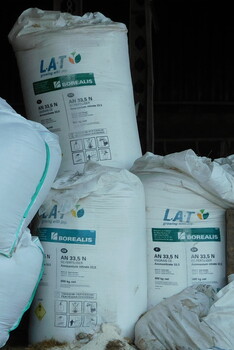In the realm of agriculture, the quest for sustainable and efficient farming practices has led to the development and utilization of advanced fertilizers. Among them, ammonium nitrate fertilizer stands out as a key player, fostering crop growth and ensuring robust yields. In this article, we’ll delve into the world of ammonium nitrate fertilizer, exploring its composition, benefits, applications, and the pivotal role it plays in modern, sustainable agriculture.
 Understanding Ammonium Nitrate Fertilizer
Understanding Ammonium Nitrate Fertilizer
Composition: Ammonium nitrate fertilizer is a chemical compound with the formula NH₄NO₃. It is a soluble, crystalline white salt that contains 34% nitrogen by weight. Nitrogen is a vital nutrient for plant growth, playing a central role in processes such as photosynthesis, protein synthesis, and overall metabolic functions.
Production Process: The production of ammonium nitrate involves a reaction between ammonia (NH₃) and nitric acid (HNO₃). The resulting product, ammonium nitrate, is then processed into granules or prills for ease of application in agriculture.
Benefits of Ammonium Nitrate Fertilizer
- High Nitrogen Content: Ammonium nitrate is prized for its high nitrogen content, providing plants with a readily available source of this essential nutrient.
- Quick Nutrient Uptake: The ammonium form of nitrogen in this fertilizer is readily absorbed by plant roots, facilitating rapid nutrient uptake and promoting swift growth.
- Versatility: Ammonium nitrate is a versatile fertilizer suitable for a wide range of crops, making it a go-to choice for farmers cultivating diverse agricultural products.
- pH Neutral: The pH of ammonium nitrate is close to neutral, reducing the risk of soil acidification commonly associated with some other nitrogen fertilizers.
- Hygroscopic Properties: Ammonium nitrate has hygroscopic properties, meaning it readily absorbs moisture. This characteristic ensures that the fertilizer dissolves quickly when applied, enhancing its efficacy.
Applications in Agriculture
- Nitrogen Source for Plants: The primary role of ammonium nitrate in agriculture is to serve as a direct source of nitrogen for plants. Nitrogen is an integral component of amino acids, proteins, and chlorophyll, all of which are crucial for plant growth and development.
- Boosting Crop Yields: By providing an easily assimilable form of nitrogen, ammonium nitrate contributes to increased crop yields. It promotes the development of healthy foliage, supports flowering, and enhances overall plant vigor.
- Balanced Fertilization Programs: Ammonium nitrate is often incorporated into balanced fertilization programs, where it complements other nutrient sources to ensure that crops receive a comprehensive array of essential elements.
- Customized Application: The fertilizer can be applied in various ways, including broadcasting, side-dressing, and incorporation into the soil. This flexibility allows farmers to tailor application methods based on crop type, growth stage, and regional agricultural practices.
- Greenhouse Cultivation: Ammonium nitrate is well-suited for greenhouse cultivation, where precise nutrient management is crucial. Its water-soluble nature makes it easy to administer through irrigation systems.
Environmental Considerations
While ammonium nitrate is a valuable fertilizer, it is crucial to acknowledge and address potential environmental concerns associated with its use:
- Risk of Nitrate Runoff: Excessive application of nitrogen-based fertilizers, including ammonium nitrate, can contribute to nitrate runoff, potentially contaminating water sources and leading to environmental issues such as algal blooms.
- Air Quality Concerns: Under specific conditions, ammonium nitrate can undergo reactions that release nitrogen oxides (NOx) into the atmosphere. NOx emissions can contribute to air pollution and have implications for human health.
Mitigation Strategies
To minimize environmental impacts, farmers and agricultural professionals can adopt the following strategies:
- Precision Agriculture: Implement precision agriculture practices to optimize fertilizer application, reducing the risk of overapplication and subsequent runoff.
- Cover Crops: Integrate cover crops into agricultural systems to capture excess nutrients and prevent soil erosion, helping to mitigate the risk of nitrogen runoff.
- Buffer Zones: Establish buffer zones near water bodies to capture and filter potential nutrient runoff before it reaches sensitive aquatic ecosystems.
- Use of Nitrification Inhibitors: Employ nitrification inhibitors, which slow down the conversion of ammonium nitrogen to nitrate nitrogen, reducing the likelihood of nitrate leaching.
 The Role of Ammonium Nitrate in Sustainable Agriculture
The Role of Ammonium Nitrate in Sustainable Agriculture
Ammonium nitrate fertilizer plays a pivotal role in advancing sustainable agricultural practices:
- Optimizing Nutrient Use Efficiency: Through its quick and efficient nutrient uptake, ammonium nitrate contributes to optimizing nutrient use efficiency in crops, minimizing waste and maximizing the benefits of applied fertilizers.
- Supporting Precision Agriculture: The versatility of ammonium nitrate aligns with precision agriculture principles, allowing for targeted and site-specific nutrient applications tailored to the unique needs of different crops and regions.
- Balancing Soil Health: When incorporated into balanced fertilization programs, ammonium nitrate helps maintain soil health by providing essential nutrients in appropriate proportions. This approach supports long-term agricultural sustainability.
- Enhancing Crop Resilience: By promoting robust plant growth and development, ammonium nitrate enhances the resilience of crops to environmental stressors, contributing to more reliable and sustainable yields.
Conclusion
Ammonium nitrate fertilizer stands as a cornerstone in modern agriculture, offering a potent and efficient source of nitrogen to support crop growth. While its benefits are significant, responsible and sustainable use is paramount to mitigate potential environmental concerns. Through precision agriculture, balanced fertilization programs, and strategic mitigation measures, farmers can harness the power of ammonium nitrate to cultivate healthy crops and contribute to the long-term sustainability of global agriculture. As technology and agricultural practices continue to evolve, the responsible application of fertilizers like ammonium nitrate will play a crucial role in feeding the world’s growing population while safeguarding the health of our planet.

